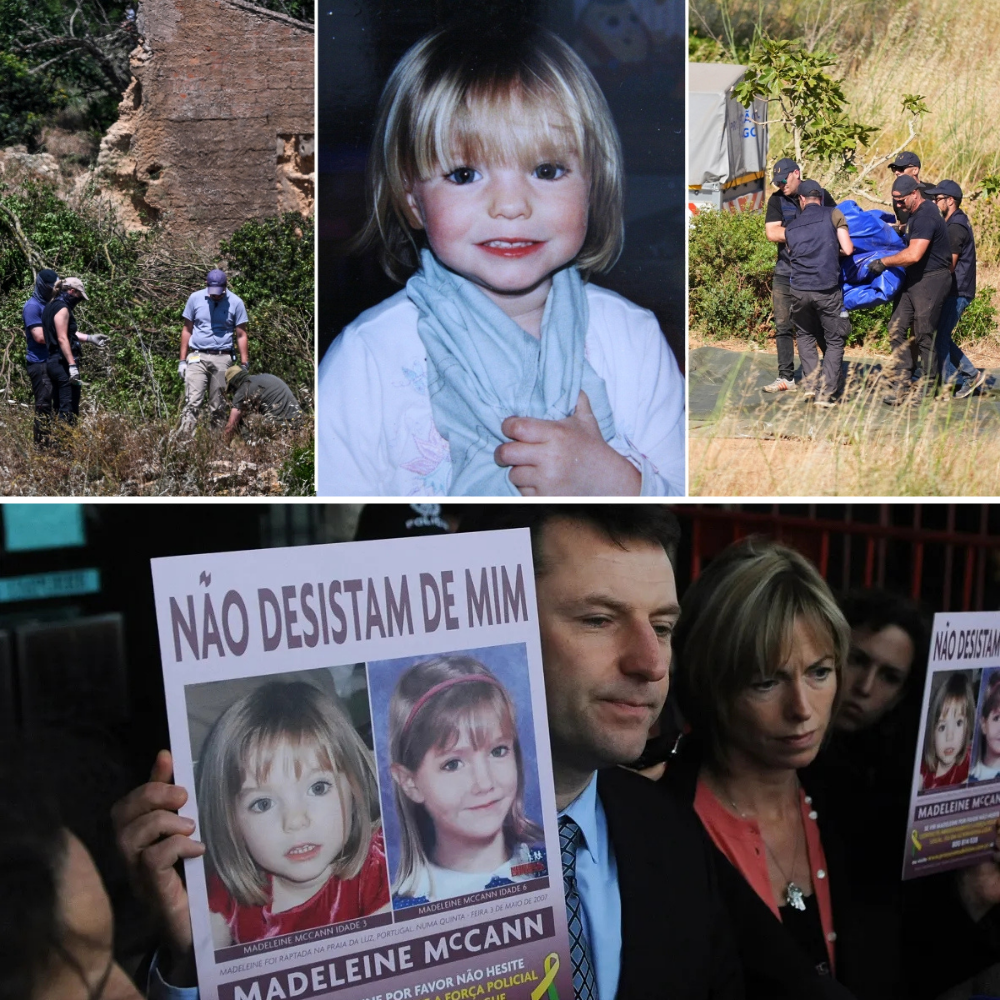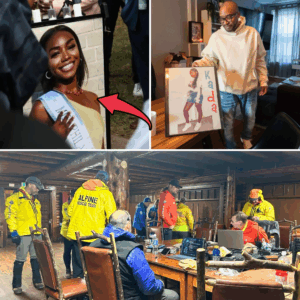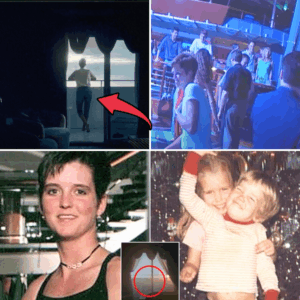
On a balmy evening in May 2007, the tranquil resort town of Praia da Luz, Portugal, became the epicenter of a mystery that would grip the world for nearly two decades. Madeleine McCann, a three-year-old British girl, vanished from her family’s holiday apartment, sparking one of the most high-profile missing-person cases in modern history. Now, in a dramatic escalation, authorities have announced an expanded search operation, combing new areas in hopes of uncovering clues to the fate of the child whose disappearance has haunted millions. Yet, it is the enigmatic reaction of Madeleine’s parents, Kate and Gerry McCann, that has cast a shadow over the renewed efforts, raising fresh questions about their role and the future of this perplexing case.
The disappearance of Madeleine McCann on May 3, 2007, unfolded under circumstances that were both ordinary and chilling. The McCanns, both doctors from Leicestershire, England, were vacationing with their three children—Madeleine and her two-year-old twin siblings—at the Ocean Club resort. That evening, they dined with friends at a tapas restaurant just 55 meters from their ground-floor apartment, leaving the children asleep inside. The group adopted a routine of periodic checks on the sleeping children, a decision that would later draw intense scrutiny. At around 10:00 PM, Kate McCann returned to the apartment and discovered Madeleine’s bed empty, the window open, and her daughter gone. The ensuing panic triggered a massive response, with local police, volunteers, and eventually international authorities joining the search.
The initial investigation by Portuguese police, led by the Guarda Nacional Republicana, leaned heavily on the theory of abduction. The proximity of the restaurant to the apartment, the open window, and the absence of any signs of a struggle pointed to an opportunistic crime. However, as days turned into weeks with no trace of Madeleine, the case took a darker turn. By August 2007, suspicions shifted toward Kate and Gerry McCann themselves. Portuguese authorities, now under the direction of the Polícia Judiciária, theorized that Madeleine might have died accidentally—possibly due to an overdose of sedatives given to help her sleep—and that her parents had concealed her body to avoid culpability. This hypothesis was fueled by the findings of British sniffer dogs, which detected traces of blood and cadaver scent in the McCanns’ apartment and a rental car they used weeks after the disappearance.
The decision to name Kate and Gerry McCann as “arguidos” (formal suspects) in September 2007 sent shockwaves through the global media. The couple, who had tirelessly campaigned for their daughter’s safe return, faced accusations of orchestrating a cover-up. Portuguese tabloids, including the now-defunct Tal e Qual, published sensational claims that the McCanns had killed Madeleine and hidden her body. The pressure on the couple was immense, with Kate publicly pleading for her daughter’s abductor to show mercy while simultaneously defending her family against a barrage of allegations. By July 2008, however, the Portuguese investigation stalled, and the McCanns were cleared as suspects due to insufficient evidence. The case was archived, leaving the mystery unresolved.
Over the years, the McCanns have remained steadfast in their quest for answers. They established the Madeleine Fund, raising millions with support from celebrities like J.K. Rowling, David Beckham, and Simon Cowell. High-profile appeals, including a meeting with Pope Benedict XVI and lobbying from then-UK Prime Minister Gordon Brown, kept the case in the public eye. In 2011, the British Metropolitan Police launched Operation Grange, a renewed effort to investigate Madeleine’s disappearance, costing over £10 million to date. Despite these efforts, no definitive breakthroughs emerged until 2020, when German authorities identified Christian Brückner, a convicted pedophile and burglar, as a prime suspect. Brückner, who lived near Praia da Luz at the time of the disappearance, has a history of targeting holiday homes and committing sexual crimes against children. Though he denies involvement, his identification marked a significant shift in the investigation.
The latest development, announced in 2025, involves an ambitious expansion of the search radius around Praia da Luz. Portuguese and German authorities, in coordination with British police, are now scouring previously unexplored areas, including remote reservoirs and wooded regions. This operation, prompted by new intelligence possibly linked to Brückner, represents a renewed commitment to solving the case. Advanced forensic technologies and geophysical equipment are being deployed to detect any traces of Madeleine, whether physical remains or personal belongings. The scale of the search underscores the determination of investigators to provide closure, even as the trail grows colder with each passing year.
Yet, it is the response of Kate and Gerry McCann to this latest development that has reignited public and media intrigue. In a carefully worded statement, the couple expressed gratitude for the continued efforts but stopped short of endorsing the new search unequivocally. Their reserved tone, coupled with a cryptic remark about “hoping for answers while protecting our family’s privacy,” has fueled speculation. Some observers interpret their reaction as a sign of emotional exhaustion after years of false hopes and relentless scrutiny. Others, however, see it as a guarded stance, possibly hinting at concerns about what the search might uncover—or how it might reflect on their past actions.
The McCanns’ behavior has long been a lightning rod for controversy. Critics point to their decision to leave their children unattended as a critical lapse in judgment, one that may have violated UK parenting laws, though no charges were ever filed. The couple’s media-savvy approach—hiring PR consultants, publishing a book, and maintaining a high-profile campaign—has also drawn mixed reactions. Supporters view them as devoted parents fighting against overwhelming odds, while detractors argue their actions have at times seemed calculated to shape public perception. The 2007 allegations, though disproven, left a lingering stain, with some still questioning whether the full truth has been revealed.
The expanded search has also revived older theories about Madeleine’s fate. One persistent hypothesis suggests she was abducted by a trafficking ring, possibly smuggled across borders to North Africa or Eastern Europe. Reports of sightings in Morocco and Argentina, though unverified, fueled this narrative early on. Another theory posits that Madeleine wandered out of the apartment and met with an accident, though extensive searches of the surrounding area found no evidence to support this. The Brückner angle, however, remains the most compelling. His criminal record, including a 2005 rape in Praia da Luz, and phone records placing him near the resort on the night of May 3, 2007, make him a strong candidate. Yet, without concrete evidence—such as Madeleine’s remains or a confession—prosecutors have struggled to build a case.
The public’s fascination with the Madeleine McCann case stems from its blend of tragedy, mystery, and moral ambiguity. It raises uncomfortable questions about parental responsibility, the limits of law enforcement, and the role of media in shaping narratives. The McCanns’ journey—from grieving parents to suspected perpetrators to tireless advocates—embodies the complexity of a case with no easy answers. Their latest reaction, perceived by some as reticent, has only deepened the enigma. Are they bracing for painful truths, or simply guarding their hard-won resilience against another wave of speculation?
As the search intensifies, the world watches with bated breath. The Praia da Luz landscape, once a backdrop to carefree holidays, now holds the weight of an unresolved tragedy. For Kate and Gerry McCann, the expanded operation is both a beacon of hope and a reminder of their unending ordeal. Whether this latest effort will finally unravel the mystery of Madeleine’s disappearance remains uncertain. What is clear, however, is that the case continues to captivate and confound, a puzzle whose pieces may never fully align.
For now, the McCanns and the authorities press forward, driven by the faint possibility of closure. The questions raised by their response linger, echoing the broader uncertainties of a case that has defied resolution for nearly two decades. As investigators dig deeper into the Portuguese terrain, they are not just searching for Madeleine—they are probing the limits of truth itself.




